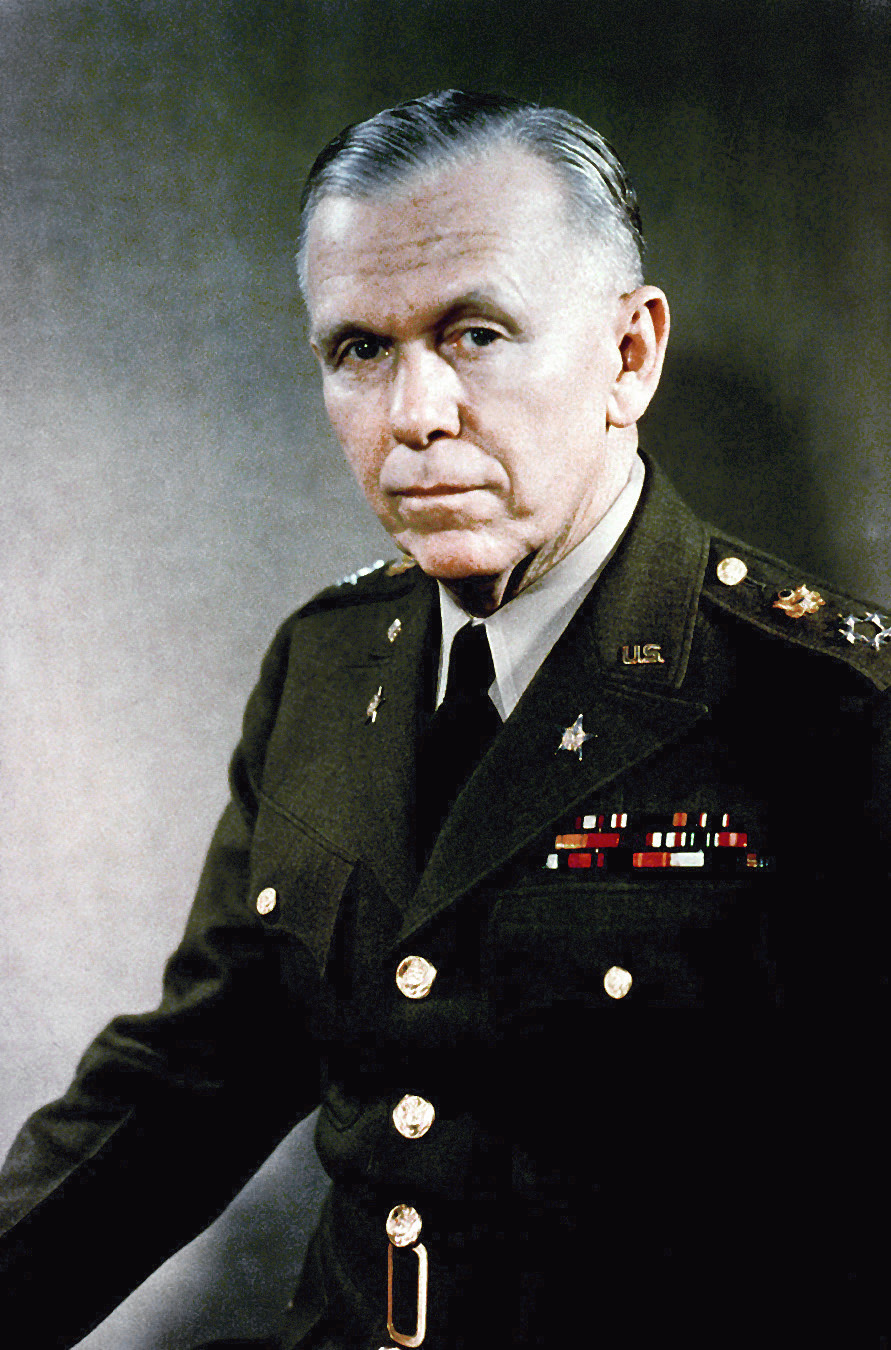George Catlett Marshall Jr. was an American soldier and statesman. He rose through the United States Army to become Chief of Staff under presidents Franklin D. Roosevelt and Harry S. Truman, then served as Secretary of State and Secretary of Defense under Truman. Winston Churchill lauded Marshall as the "organizer of victory" for his leadership of the Allied victory in World War II, although Marshall declined a final field leadership position that went to his protégé, later U.S. President, Dwight D. Eisenhower. After the war, as Secretary of State, Marshall advocated a significant U.S. economic and political commitment to post-war European recovery, including the Marshall Plan that bore his name. In recognition of this work, he was awarded the Nobel Peace Prize in 1953.Born in Uniontown, Pennsylvania, Marshall graduated from the Virginia Military Institute in 1901. After serving briefly as commandant of students at the Danville Military Academy in Danville, Virginia, Marshall received his commission as a second lieutenant of Infantry in February, 1902. In the years after the Spanish–American War, he served in the United States and overseas in positions of increasing rank and responsibility, including platoon leader and company commander in the Philippines during the Philippine–American War. He was the Honor Graduate of his Infantry-Cavalry School Course in 1907, and graduated first in his 1908 Army Staff College class. In 1916 Marshall was assigned as aide-de-camp to J. Franklin Bell, the commander of the Western Department. After the United States entered World War I, Marshall served with Bell while Bell commanded the Department of the East. He was assigned to the staff of the 1st Division, and assisted with the organization's mobilization and training in the United States, as well as planning of its combat operations in France. Subsequently, assigned to the staff of the American Expeditionary Forces headquarters, he was a key planner of American operations including the Meuse-Argonne Offensive.
After the war, Marshall became an aide-de-camp to John J. Pershing, who was then the Army's Chief of Staff. Marshall later served on the Army staff, commanded the 15th Infantry Regiment in China, and was an instructor at the Army War College. In 1927, he became assistant commandant of the Army's Infantry School, where he modernized command and staff processes, which proved to be of major benefit during World War II. In 1932 and 1933 he commanded the 8th Infantry Regiment and Fort Screven, Georgia. Marshall commanded 5th Brigade, 3rd Infantry Division and Vancouver Barracks from 1936 to 1938, and received promotion to brigadier general. During this command, Marshall was also responsible for 35 Civilian Conservation Corps camps in Oregon and southern Washington. In July 1938, Marshall was assigned to the War Plans Division on the War Department staff, and later became the Army's Deputy Chief of Staff. When Chief of Staff Malin Craig retired in 1939, Marshall became acting Chief of Staff, and then Chief of Staff, a position he held until the war's end in 1945.
As Chief of Staff, Marshall organized the largest military expansion in U.S. history, and received promotion to five-star rank as General of the Army. Marshall coordinated Allied operations in Europe and the Pacific until the end of the war. In addition to accolades from Churchill and other Allied leaders, Time magazine named Marshall its Man of the Year for 1943. Marshall retired from active service in 1945, but remained on active duty, as required for holders of five-star rank. From December 15, 1945 to January 1947 Marshall served as a special envoy to China in an unsuccessful effort to negotiate a coalition government between the Nationalists of Chiang Kai-shek and Communists under Mao Zedong.
As Secretary of State from 1947 to 1949, Marshall advocated rebuilding Europe, a program that became known as the Marshall Plan, and which led to his being awarded the 1953 Nobel Peace Prize. After resigning as Secretary of State, Marshall served as chairman of American Battle Monuments Commission and president of the American National Red Cross. As Secretary of Defense at the start of the Korean War, Marshall worked to restore the military's confidence and morale at the end of its post-World War II demobilization and then its initial buildup for combat in Korea and operations during the Cold War. After resigning as Defense Secretary, Marshall retired to his home in Virginia. He died in 1959 and was buried with honors at Arlington National Cemetery.
Wikipedia
✵
31. December 1880 – 16. October 1959
